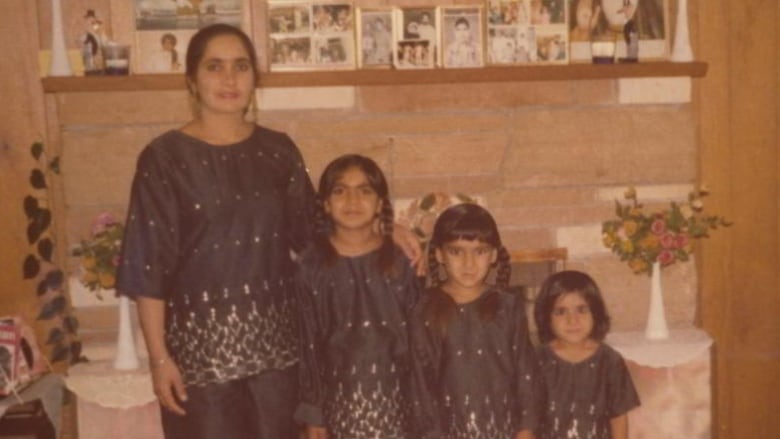B.C. family's dark secret of sexual abuse explored in new documentary
Because We Are Girls, premiering at Hot Docs, centres around the Pooni sisters of Williams Lake, B.C.

Warning: This story contains descriptions of sexual assault.
For years, Jeeti Pooni never told anyone about the sexual abuse she experienced as a child in Williams Lake, B.C.
She suffered in silence, full of shame and fear that she would be punished if she told her parents what her older cousin had been doing to her.
Then she learned she was not alone.
"I was 22 years old when I found out that it had happened to all of my sisters," Pooni said. "That was the darkest day of my life."
The story of the Pooni sisters — and the criminal trial they pursued against their abuser — is at the heart of the new film Because We Are Girls, premiering Wednesday at Toronto's Hot Docs festival.
Pooni and director Baljit Sangra joined As It Happens host Carol Off in studio to discuss the film and the sisters' quest for justice.
'It became a routine'
Pooni was 11 the first time she was raped.
It was October 1980, and her 19-year-old cousin was one of several distant relatives from her parents' home country of India who were staying at her family home.
She and her sisters called him Bhaaji, a term of endearment that means "older brother."

"One of my aunts was in the bedroom, and somehow he managed to open my bedroom door quietly and shook my leg and asked me to come outside. And I remember being really sleepy and groggy and looking at this shape and I'm like, 'Oh, OK, it's Bhaaji. He must have something to say,'" Pooni said.
"I got up and I went outside and he waited for me in the hallway. And then from there, he took me into our family living room and that's where he raped me."
It was the first of many.
"It would happen probably thousands of times," she said. "It became a routine."
'It was not safe to tell anyone'
There are a lot of reasons Pooni didn't tell anyone what was happening — among them, fear, shame and a Punjabi culture that prizes modesty and submission in girls.
She remembers her father teaching his daughters to revere and respect their male elders. She remembers watching Bollywood movies where rape victims would fling themselves off cliffsides because of the shame.
And she remembers stories about other Punjabi girls in Williams Lake who were sent away to India if their parents got wind of any indiscretions.
"It was not safe to tell anyone," she said. "You know that from a very young age that you're going to be blamed, so just keep your mouth shut."

When Pooni and her sisters finally revealed their truths to each other, they decided to tell their parents, too.
Her father's reaction is still embedded in her mind, she said.
"I'll never forget that day. His head was bowed, shoulders slumped. He cried. We all did," she said.
- HOT DOCS: Syrian journalist stays in Aleppo after her daughter was born
- HOT DOCS: Indigenous boy who speaks 3 languages almost failed out of school
The family promised to set up a meeting between the cousin's family and their own so the sisters could finally air their grievances.
"But then that never happened. And instead, what started happening was the finger-pointing. 'Oh, Jeeti this, Jeeti that. Because of Jeeti, that's why the others got abused as well,'" Pooni said.
"I immediately got therapy for myself and four months later, I was ready to go to the police. And I looked at my sister Kira and said, 'OK, our parents aren't going to do anything about this. Let's do this.' And we called the police."
Courts and cameras
In 2007, she told her friend Sangra — a filmmaker — that she and her sisters were planning to pursue charges against their childhood abuser and that they hadn't yet told their parents.
"I'm like, wow, this would be a really amazing documentary for our community," Sangra said.
She had incredible access to family in the years that followed and was with them every step of the way as the case wound its way through the courts.
Pooni's parents testified in court and participated in the documentary, which she sees as their way of making amends.

Sangra tells the story through an empathetic lens.
"I'm from the same community as them, so I've grown up with the same social and cultural values," she said. "There's a lot there that doesn't even have to be explained."
She says she built trust with the family over time.
"It was low and slow, like a peeling of an onion," Sangra said.
"They were doing the best with what they knew, that they had a lot of pressures at a young age, sponsoring their family. I told them I know that that was an important part of the story, too."
Getting justice
The court case was long and drawn out, with several delays.
It eventually made its way to the Supreme Court of B.C., which found the cousin guilty on four out of six charges of sexual assault in 2018.
He's currently challenging the ruling, arguing that the delayed sentencing was a violation of his Charter rights.
While his name is available on public records, Because We Are Girls never reveals it.
In fact, he's not depicted at all in the film.
"I just feel it's been about him from the day he landed in our family in 1980. We were supposed to respect him and give him the regard. And then going through breaking our silence, it was about him. Going through the court case, it was all about him," Pooni said.
"And now, through this film, it's about us girls — our resilience, our bravery."
Written by Sheena Goodyear. Produced by Jeanne Armstrong.